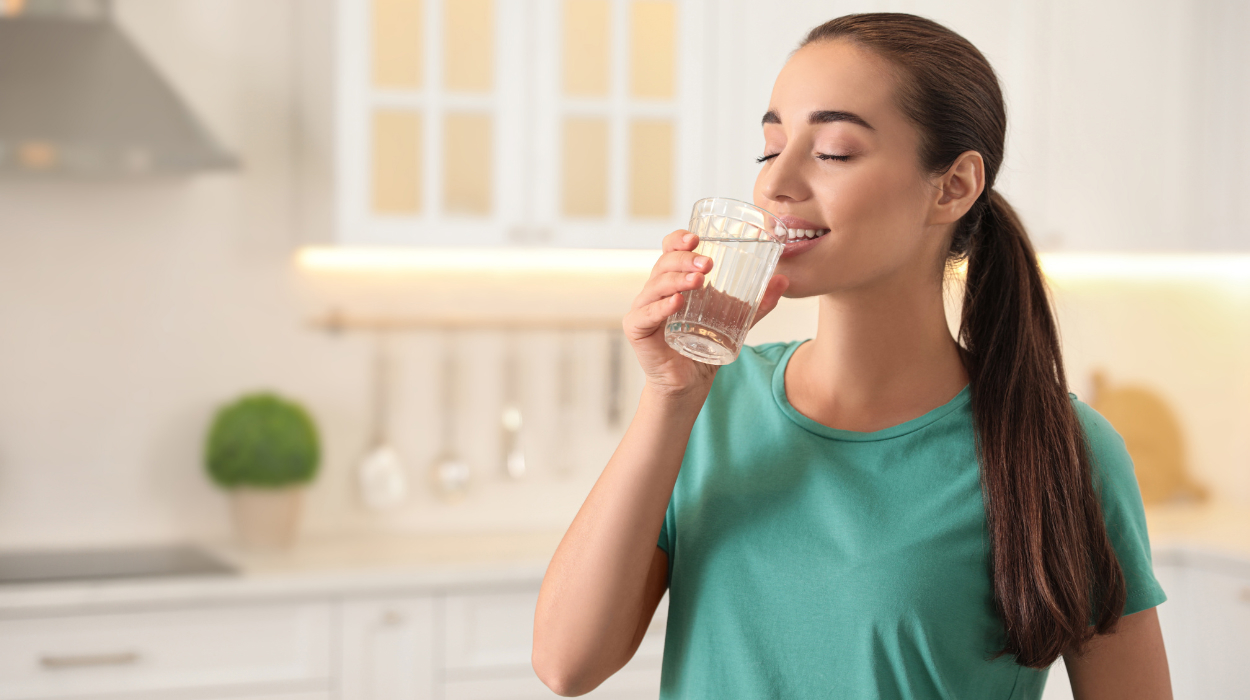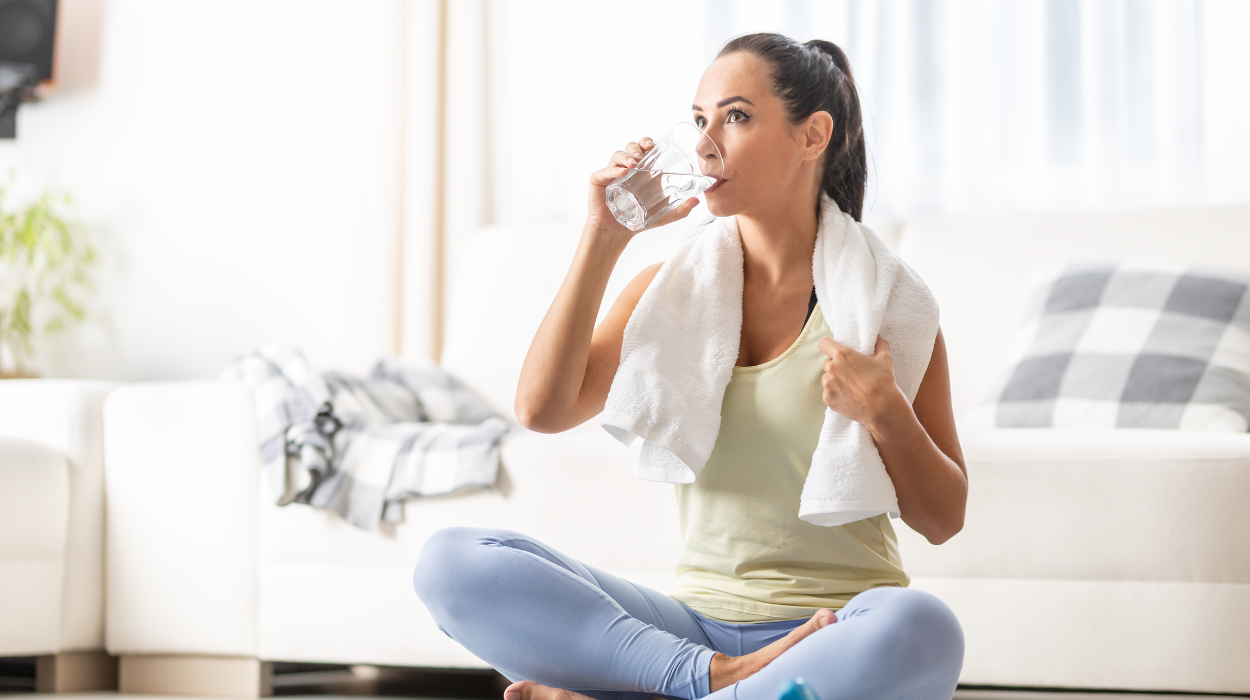Sometimes, weight loss can feel like an uphill battle. The scale might fluctuate due to water weight. At times, it can prove challenging to stick to a healthy eating regimen. But what if a simple and small change could lead to better results?
Interestingly, drinking more water can act as a natural appetite suppressant and even lower liquid calorie intake. In turn, you might achieve your body weight goals that much faster.
Still, you might wonder, how much water should I drink to lose weight? In this article, we take a closer look at when and why you may want to drink more water throughout your weight loss journey. How much water should you drink a day to lose weight? What else should you know?
Does Drinking Water Help You Lose Weight?
Yes, water can help you lose weight. Alongside a healthy diet and exercise, water can help burn fat, suppress appetite, keep you feeling full, and reduce caloric intake.
How Much Water Should You Drink To Lose Weight?

When approaching weight loss, many people immediately think of diet and exercise. While these are important, weight management and weight loss can be made easier when you drink water. This leads to the question: how much water to drink to lose weight?
There is no recommended amount of water[1] to drink per day since this can depend on various factors, such as body weight, exercise, diet, and more.
For weight loss, when to drink water may also matter as to whether or not weight loss takes place. Drinking water before a meal[2] may reduce total energy intake, leading to healthy weight loss.
A 2019 scientific review indicated that water helps with weight loss.[3] These studies assess increasing daily water intake, replacing high-caloric beverages with water, and increasing pre-meal water intake. Research further suggested that proper hydration through increased water intake[4] supported healthy weight loss.
It’s always important to remember that diet and exercise are also important in a holistic weight loss place. For instance, eating more fiber in your diet can help you feel fuller for longer as well.
Some individuals may also find that herbs for weight loss or water fasting, where one only drinks water for 24 to 72 hours, can help them shed the pounds. However, fasting should only be done under close supervision from a medical professional. Always discuss your options with your doctor before beginning any extreme fasts or lifestyle changes.
How Drinking Water Can Affect Your Weight

Drinking water contributes to weight loss and reduces the risk of weight gain in a few ways. Staying hydrated burns more calories, reduces appetite, reduces caloric intake, and may even help remove waste from the body. Below, we dig deeper into how all of this works.
Burns More Calories
Research shows that resting energy expenditure increases for obese individuals shortly after drinking water.[5] But it doesn’t just increase metabolic rate or increase calories burned.
Drinking plenty of water is also necessary for lipolysis[6] or the burning of fat. In the first stage of lipolysis, water combines with triglycerides and fats in the body to produce fatty acids and glycerol. These fatty acids and glycerol are released into the bloodstream and excreted by the body.
Reduces Appetite
Drinking enough water may suppress the appetite and keep you full, which leads to eating less. This is particularly true when consuming water before a meal. A 2018 research study suggested that pre-meal water consumption[2] could be a useful weight loss tool by reducing meal energy intake.
Reduces Caloric Intake
As mentioned above, staying hydrated, especially before eating, tends to reduce food intake. By ensuring you drink plenty of water, you’re more likely to feel full pre-meal and not try to satisfy your thirst by eating more.
Water can also replace high-sugar beverages, which can significantly reduce total daily caloric intake. In fact, if your goal is to lose weight, it can be beneficial to replace juice and other high-calorie liquid with water.
Removes Waste
Research indicates that fluid intake affects kidney function[7] and that adequate fluid intake and hydration, including water, may help protect the kidney from dysfunction or disease. Adequate hydration helps the body remove waste via urine, sweat, and bowel movements.
Additionally, fat cells[8] potentially accumulate toxins in the body. As you lose fat, toxins are released into the body. Drinking adequate water ensures your body is equipped to handle and eliminate these toxins[9] properly.
May Add Water Weight
What is the downside? Drinking more water can add extra weight, specifically water weight. However, this depends on a few factors.
For example, research indicates that excessive sodium consumption[10] alongside water intake can lead to increased fluid retention. In turn, this can lead to a higher number on the scale due to water retention in the body.
Other Benefits Of Drinking Enough Water
Beyond body composition scores, drinking water has plenty of other benefits for your body and overall health.
- Supports your workouts: For healthy and sustainable weight loss, exercise goes a long way in helping build muscles. This can help you burn more calories at rest, making weight loss and maintenance easier. Water can help support this by preventing fatigue[11] during your workouts.
- Supports joint health: Water is a component of synovial fluid, the fluid in between the joints that helps them move smoothly. When we become dehydrated, joint function may decrease, and joint pain may increase. Research even shows how dehydration can impact perceived pain[12] scores, leading to increased pain.
- Sustains good energy levels: Cognitive function can be impacted by your hydration status. Research even discusses how adequate water intake[13] can correlate with better academic performance.
- May prevent headaches: In many cases, inadequate fluid intake may potentially trigger migraines,[14] as well as irritability. By drinking enough water, many individuals may be able to prevent the onset of frequent headaches.
- Aids in digestion: Water can help break down the food you eat. It can also help prevent constipation,[9] which can be a risk factor for dehydration.
How To Increase Your Water Intake
Here are a few ways to increase water intake as you go about your day-to-day life:
- Add flavor or fizz. There are kitchen appliances that can make sparkling water at home. Alternatively, there are electrolytes and flavor drops that can be purchased in the local grocery store.
- Track your intake. Use a phone app to record daily water intake. Or write it down in a journal or on a digital sheet.
- Add it to another daily routine. There are many ways to add water to your day. Have a glass of water beside the bed so it’s ready for you when you wake up. You can also get into a habit of having a glass or two of water before a meal.
- Set reminders on your phone or smartwatch. This can ensure you remember to drink water periodically throughout the day.
- Use water to replace other drinks. Instead of soda or any other sugary beverages, have water instead. Make water your go-to beverage.
- Eat more water-rich foods. Vegetables and fruits are full of water, which can be part of a healthy weight loss diet. Go for cucumber, celery, peppers, melons, and more.
It’s worth noting here that there is such a thing as drinking too much water, called water intoxication. Water intoxication[15] can be life-threatening. This is because water can cause imbalances in electrolytes, leading to water build-up in the brain and other areas. Be mindful as you start to increase your water intake to not overdo it.
The Takeaways
Drinking lots of water can be a useful tool to burn fat and calories. Yet, it’s important to remember that healthy and sustainable weight loss takes a combined approach, including diet, physical activity, and lifestyle modifications.
Whenever making changes to your diet or lifestyle, it can be beneficial to discuss your options with your doctor. They know you best and can help you determine the best path forward toward your goals.
Frequently Asked Questions
This depends on the individual. While the recommendation used to be eight glasses a day, since then, government organizations and departments alike have determined that this can be very unique to each individual depending on weight, lifestyle, diet, and other factors.
Drinking water can contribute to healthy weight loss. Thus, it may aid in reducing belly fat. However, there is no guarantee that belly fat can be targeted. A holistic weight loss approach, including diet and exercise modifications, is necessary to see results.
Yes, this is called water intoxication, which can be life-threatening. When you drink too much water, the kidneys struggle to get rid of it in a sufficient amount of time. This can lead to fluid build-up in other areas of the body, like the brain, causing death.
Many factors impact individual water needs. However, the average person may require about eight glasses of water per day, which works out to about 64 ounces.
This varies based on the individuals. Yet, generally, about one to two liters, or 64 ounces, of water per day is recommended for weight loss.
 Evidence Based
Evidence Based
